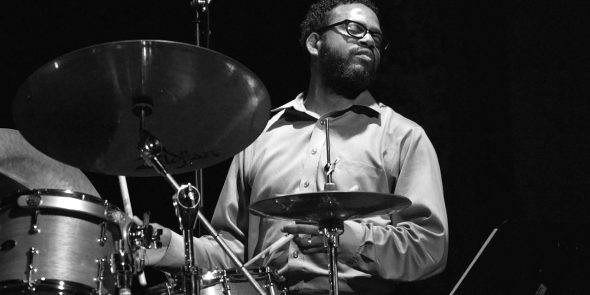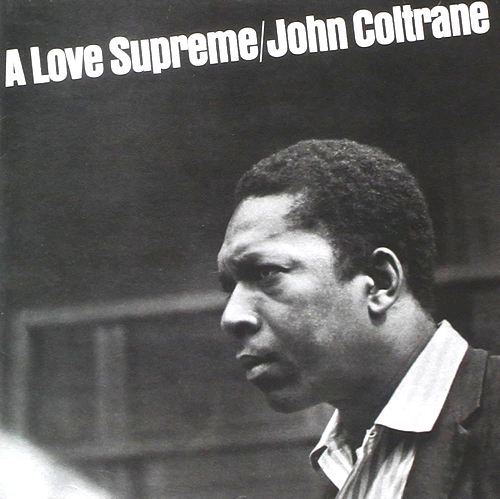
Drummer Mark Lomax II and his quartet will mark the 60th anniversary of John Coltrane’s “A Love Supreme” with a performance at the Foundry Theater at Antioch College on Saturday, Jan. 18. (Submitted photo)
Mark Lomax Quartet to celebrate ‘A Love Supreme’ anniversary at Foundry
- Published: January 17, 2025
This year marks the 60th anniversary of “A Love Supreme,” saxophonist and composer John Coltrane’s seminal 1965 album. Long considered a jazz masterpiece, the four-part suite evokes Coltrane’s deep spirituality — an element of the work with which drummer Dr. Mark Lomax II told the News last week he resonates.
Lomax, who performed in Yellow Springs in fall of 2023 as part of the Foundry Theater at Antioch College’s inaugural season of programming, will return to the Foundry with the Mark Lomax Quartet Saturday, Jan. 18.
The quartet — Lomax on drums, Edwin Bayard on tenor and soprano sax, Dr. William Menefield on piano and Dean Hulett on bass — will perform a series of works in celebration of the genesis of “A Love Supreme,” including the suite itself.
Lomax’s long study of music and body of work as both composer and musician comprise, and often fuse, a number of genres — classical, jazz, gospel and blues. A lifelong Columbus resident and a professional musician since the age of 12, Lomax began playing music in church when he was 6 — a self-described “preacher’s kid” with an intrinsic understanding of the broadly spiritual nature of music. At the same time, he said, growing up in a “very conservative Black Christian tradition,” he was often told that “secular, worldly” music was inappropriate for his young ears — which he said didn’t sit right with his own experience.
“I always felt like I was divinely inspired as it relates to composition, because where did these sounds come from? They came from me, but parts of me that, as a young person, I didn’t know,” he said. “When you don’t know, your belief system kind of fills in the gaps — so it had to be God, and God had to have then led me to these musical expressions outside of religious music that arrested me to the extent that I had to spend all of my moments learning to play, learning to understand, learning to compose.”
Lomax said he first heard “A Love Supreme” when he was 14 years old; at the time, he was playing gigs around Central Ohio, and said he spent around $200 a week on CDs, expanding his musical library and knowledge. He bought “A Love Supreme,” he said, because he had learned of John Coltrane through the work of trumpeter and bandleader Miles Davis, Coltrane’s mentor and, later, collaborator.
At the time, Lomax said, his practice was to load up his six-CD carousel player and “just let it spin” while he played video games.
“Osmosis was working for me at that time,” he said with a laugh.
When “A Love Supreme” came on, he said he didn’t hear it — he felt it.
“I had to pause the video game and just sit with the music,” he said. “What struck me was the way the music made me feel — I would not claim, at 14, to have understood what I was hearing, but how it made me feel was familiar because of the experiences that I had in this spiritual music tradition of the Black church.”

A Love Supreme is an album by the jazz saxophonist and composer John Coltrane. He recorded it in one session on December 9, 1964. It was released the following year. (Submitted photo)
“A Love Supreme” is presented as a kind of sacred song cycle — a labor of love given over to a higher power following Coltrane’s decade-long struggle with heroin and alcohol addiction. In the album’s liner notes, Coltrane writes: “During the year 1957, I experienced, by the grace of God, a spiritual awakening which was to lead me to a richer, fuller, more productive life. … This album is a humble offering to Him. An attempt to say ‘THANK YOU GOD’ through our work, even as we do in our hearts and with our tongues.”
The final track in the four-part suite, “Psalm,” features Coltrane’s lyrical phrasing against a rumble of timpani and bass and a ripple of cymbal and keys; each note Coltrane plays corresponds syllabically with the words of a poem he wrote — also included in the album’s liner notes — beginning with “A Love Supreme/I will do all I can to be worthy of Thee, O Lord” and ending with “Thank You God. Amen.” The piece, as performed, becomes a wordless, crescendoing prayer.
“Whatever was being conveyed through the saxophone, the drums, the bass and the piano, was familiar to what was being conveyed at various points in the church service through the Hammond B3 organ, the drums, the bass and the voices,” Lomax said. “For me, that’s what made the connection. … And I knew at that time that, no matter how impacted I was by this work, it was not for me to play at that age.”
Between the ages of 16 and 22, Lomax took three lessons from drummer Elvin Jones, who played on “A Love Supreme.” He learned and grew as a drummer and composer, and said he never tried to replicate what he’d heard in “A Love Supreme,” but that he was inspired to incorporate the album’s aesthetic into his own works.
It wasn’t until just a few years ago, Lomax said, that he felt emboldened to finally approach “A Love Supreme” not only as a listener, but as a performer. The moment of epiphany came while recording Lomax’s original work, “400: An Afrikan Epic,” a 12-album cycle that explores the history of Black Americans.
“Recording one of the albums, ‘Dance of the Orishas,’ we got to a vibration very reminiscent of what the Coltrane quartet achieved on ‘A Love Supreme,’ and we all looked at each other and said, ‘OK, maybe it’s time to deal with this music,’” Lomax said. “We had matured enough to not copy it and bring a kind of spiritual energy into the work without note-for-note trying to do what Trane and his group did. And with the 60th anniversary — now’s the time, right?”
The Mark Lomax Quartet will perform a program in two parts at the Foundry: The first half will be four original pieces inspired by Coltrane and his works, with each written by a member of the quartet. The second half will be a performance of “A Love Supreme.”
Lomax noted that the quartet’s performance of Coltrane’s suite is not intended to be a “tribute” to the album, but a “celebration.” The distinction, he said, is in how the music will be performed.
“When a lot of people do tributes, they emulate in ways that tie their performance to the original performance,” he said. “We’re not going to do that — we’re going to play it our way. For me, it’s a celebration of what this album opened up for me, artistically and spiritually, to connect these worlds that were disparate.”
He added that, though he’s heard “A Love Supreme” innumerable times, the quartet hasn’t studied the work closely ahead of the upcoming performance.
“I don’t want it top of mind — I want us to be able to go in relatively fresh,” he said.
The Mark Lomax Quartet’s appearance at the Foundry will be the second of two performances the group will present in celebration of “A Love Supreme,” with the first the night before, in Cincinnati. As a classical composer and “lover of all things classical music,” Lomax pointed out that orchestras will often perform a program several nights in a row.
“If I have an opportunity, I will go see [an orchestral performance] on that middle night, because you’ve gotten the first one out of the way, and you’re not so relaxed that it’s the last one — it’s right in the sweet spot to me,” he said.
In contrast to orchestral programs, the quartet’s improvisational style, he said, means the more they play a program, the more it evolves.
“So there’s no sweet spot in the middle of the performance cycle — the last time we play it is often the best time,” he said. “So we’re coming to the Foundry on the last night. … By the time we get to the Foundry, we’ll have sat with it, and I’m looking forward to that; we’re going to record that performance.”
Though 14-year-old Lomax didn’t yet have the experience and skill to fully understand, much less take on, a work like “A Love Supreme,” present-day Lomax — now a master of his craft — said he interprets the album as an expression of “radical humanity.”
“This was [Coltrane’s] offering back to God after going through a situation that was really life or death for him,” Lomax said. “What that essentially means to me is that [‘A Love Supreme’] is a prayer of gratitude — and often, those kinds of things come from a place of love and deep feelings of belonging and well-being. … Our purpose for doing all of this is to see where we are in terms of our maturity as artists and musicians and begin to focus on programs that reflect that radical humanity.”
The Mark Lomax Quartet will present a musical celebration of John Coltrane and “A Love Supreme” Saturday, Jan. 18, 7–9 p.m., in the Foundry Theater. Tickets are $30 for general admission and $5 for students and those under 18. For more information, go to http://www.bit.ly/FoundryLomax2025.
The Yellow Springs News encourages respectful discussion of this article.
You must login to post a comment.
Don't have a login? Register for a free YSNews.com account.











No comments yet for this article.